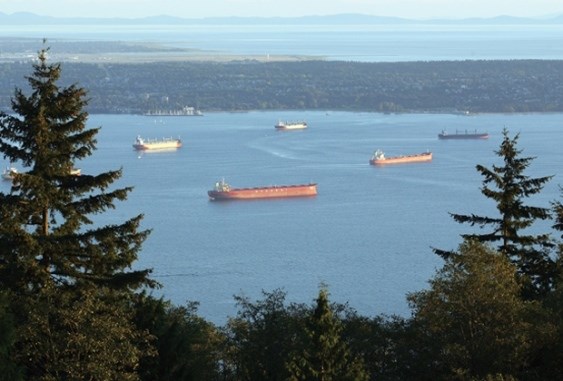All three of the North Shore's municipal governments have taken a critical stance on Kinder Morgan's application to twin its pipeline to Burnaby.
Following council meetings this month, the City and District of North Vancouver are applying to the National Energy Board to have intervener status when hearings into the pipeline expansion begin later this year.
City council members voted unanimously Monday night on a motion from Coun. Pam Bookham to apply for intervener status to make sure Kinder Morgan has "adequately accounted for the potential social, environmental and economic impacts that their proposal could have on the City of North Vancouver."
Kinder Morgan is seeking to twin approximately 981 kilometres of its Trans Mountain pipeline, which runs between Edmonton and Burnaby. The expansion would allow the energy giant to nearly triple the amount of oil exported, from 300,000 to 890,000 barrels a day. Traffic in the harbour would also increase, with 34 tankers hauling oil each month.
Currently, only five vessels typically carry oil out of the harbour each month.
Coun. Craig Keating expressed pragmatic concern.
"I'm not one to say that all pipelines are bad. If they are, we should rip out the ones that exist and see how far we get on our next drive. Having said that, I'm deeply opposed to the notion that we're sending abroad raw bitumen without processing it here in Canada. We're shipping jobs overseas. I think that needs to be an economic impact we discuss," he said, adding that expanding pipelines through urban areas is also troubling.
The District of North Vancouver council voted unanimously withhold support on Kinder Morgan's proposed pipeline expansion at a Jan. 20 meeting. The district will not support the expansion unless their concerns over oil spill foreshore damage can be allayed.
"We're in a situation where we have all the risk and no reward," said Coun. Doug MacKay-Dunn.
Despite the chances of a spill rising exponentially with the expansion, there has been no compelling study on how heavy oil such as diluted bitumen reacts in the region's marine environment, according to MacKay-Dunn.
The statistical risk of a spill is too great to be ignored, said Coun. Robin Hicks, adding the response from the Western Canadian Marine Response Corp. could be "entirely inadequate."
When discussing the issue last November, WCMRC representative Mark Johncox said the spill response team could not treat a spill if the weather makes their job lifethreatening.
"We can't respond in a full-on hurricane," Johncox said.
WC MRC could respond to a spill in the port within one hour and can handle a maximum spurt equivalent to 175,000 barrels, according to a district staff report. The capacity of an Aframax tanker is approximately 450,000 barrels.
An oil spill in the district could go untreated for as long as six hours, according to Johncox.
Maplewood mudflats was judged to be especially susceptible to harm from a spill because of its proximity to the terminal, according to a staff report.
The community has very little trust in spill response, according to Coun. Lisa Muri, who cited "grave concerns" over the financial and ecological costs of bitumen cleanup, which would damage the fishing and tourism industries.
"The Alberta and Canadian government will tell us at the end of the day that we are rich, our economy is strong. I ask them at what expense?" she said.
Applying to be heard by the National Energy Board won't cost the city and district anything but staff time.
But following through and making a formal presentation will cost "significant" dollars, city Mayor Darrell Mussatto said. Metro Vancouver has also applied and intends to follow through, representing the interests of Lower Mainland municipalities, Mussatto added, so the city can still have a say without the high cost.
District of West Vancouver council also voted to voice opposition to the project in the form of a letter but is not seeking intervener status.



